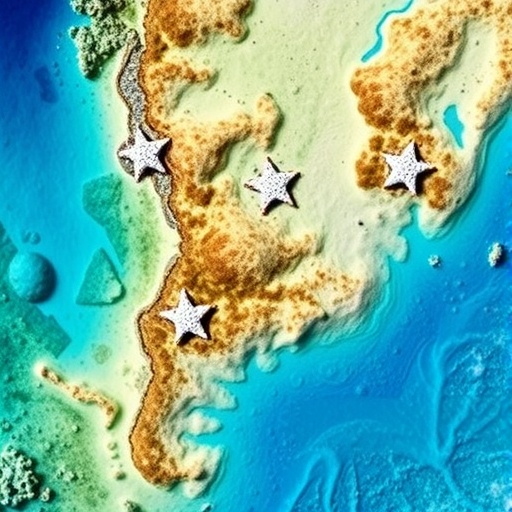In a remarkable edge of marine research, scientists have unveiled a significant relationship between turbidity and coral bleaching along the Brazilian coast. As rising ocean temperatures and climate change continue to challenge the survival of coral reefs globally, understanding the factors that influence coral health has never been more critical. The study offers a refreshing perspective on managing coral ecosystems, particularly in environments significantly affected by coastal development and sediment runoff.
Recent research by Gaspar et al. reveals that increased turbidity, typically a negative indicator for marine life, can have a complex role in mitigating the severe impacts of coral bleaching. The research indicates that while high turbidity levels may hinder sunlight penetration essential for coral photosynthesis, they can also provide some protective effects against bleaching—a phenomenon that is taking a toll on coral populations worldwide. This duality highlights the complex interplay between different environmental factors and their combined impact on coral reef ecosystems.
The backdrop of this study lies in the alarming rates at which coral reefs are deteriorating. Climate change has initiated a spiral of bleaching events across the globe, mainly driven by rising sea temperatures. Coral reefs, which host a diverse array of marine species and are vital for coastal protection, face unprecedented stressors. From pollution to increased ocean temperatures, the future of these ecosystems hangs in the balance, making the exploration of protective measures more urgent.
Research has extensively documented the adverse effects of bleaching, where corals expel the symbiotic algae residing in their tissues due to stress conditions. The loss of these algae leads to a stark decline in the corals’ vibrant colors, leaving them largely white and vulnerable. However, Gaspar and colleagues propose that turbidity from human activities can play a counterintuitive role, offering limited refuge by reducing light intensity and thus stress on corals during heatwaves.
In their meticulous study, the researchers collected data from various coral reef sites along the Brazilian coastline, analyzing the relationship between turbidity levels and coral bleaching severity. Their groundbreaking findings indicate that locations with higher turbidity exhibited less severe bleaching compared to clearer waters. This suggests that, under certain conditions, turbidity can act as a protective shield against the harsh effects of increased sea temperatures.
Critically, this research does not advocate for increased turbidity, as the negative impacts of sedimentation can also severely harm coral ecosystems. Instead, it emphasizes the need for a nuanced understanding of how different environmental factors interact in shaping coral resilience. The findings pave the way for a more integrated approach to coral reef management that recognizes the multifaceted relationships within marine ecosystems.
Beyond the immediate implications for coral health, the study underscores the necessity for continual monitoring and adaptive management strategies. With climate shift trends set to accelerate, scientists are called to explore innovative avenues for protecting these vital ecosystems. Understanding how various stressors, including turbidity, interplay will be crucial in devising strategies to buffer corals against the ongoing threats posed by climate change.
Moreover, the research garners attention on a local and global scale, highlighting the significance of awareness regarding water quality management in coastal regions. Cities near coastlines and their management practices can have direct consequences on nearby coral reefs. Therefore, environmental policies emphasizing reduced runoff and sediment control could benefit coral ecosystems while promoting sustainable coastal development.
Emerging from this study is the question of how communities can engage with marine conservation strategies. Local stakeholders may benefit from collaborative efforts in coastal management, leading to the implementation of practices that seek to balance development with ecological preservation. Raising awareness among fishermen, tourism operators, and the general public is essential to foster a culture of sustainability and respect for marine environments.
This study also opens avenues for future research in marine biology. As scientists gain a clearer understanding of the dynamics between turbidity and coral health, they can delve deeper into the mechanisms at play. Investigating specific coral species’ responses to varying turbidity levels, for instance, might yield critical insights into developing targeted strategies for conservation in different geographical contexts.
In addition to its substantive findings, the study serves as a reminder of the importance of interdisciplinary approaches to environmental research. By merging marine biology with environmental science and policy, researchers can create a comprehensive perspective that informs better decision-making processes. Collaborative efforts between scientists, policymakers, and local communities will be pivotal in navigating the complexities of marine conservation.
Ultimately, the findings published in Coral Reefs by Gaspar et al. spotlight an essential area of ongoing discourse in coral reef ecology. As coral bleaching remains an urgent crisis, understanding the multifaceted effects of environmental conditions like turbidity may offer surprising avenues for resilience. The study stands as both a reflection of the current challenges faced by marine ecosystems and an inspirational framework for future research and conservation efforts.
The implications of this study resonate far beyond the Brazilian coast; they call to action conservationists and marine scientists worldwide. By embracing this complexity and fostering dialogues around coastal management strategies, we can take steps toward protecting coral reefs. The battle against coral bleaching continues, but every new finding brings hope and potential pathways toward safeguarding these remarkable ecosystems for generations to come.
As we stand on the brink of critical environmental change, the need for sustained research and informed management practices has never been clearer. The world is watching, and as we unravel these profound connections in nature, we hold the keys to ensuring the survival of coral reefs amidst the mounting challenges posed by a rapidly changing climate.
Subject of Research: The impact of turbidity on coral bleaching along the Brazilian coast.
Article Title: Partial attenuation of coral bleaching by turbidity along the Brazilian coast.
Article References:
Gaspar, T.L., Francini-Filho, R., Mies, M. et al. Partial attenuation of coral bleaching by turbidity along the Brazilian coast. Coral Reefs (2025). https://doi.org/10.1007/s00338-025-02745-3
Image Credits: AI Generated
DOI:
Keywords: Coral bleaching, turbidity, Brazil, coral reefs, marine ecosystems, climate change, conservation, environmental management.




